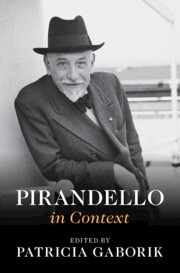Book contents
- Pirandello in Context
- Pirandello in Context
- Copyright page
- Dedication
- Contents
- Figures
- Contributors
- Preface
- Acknowledgments
- Chronology
- List of Cited Titles in Translation and the Original Italian
- Part I Places
- Part II Institutions
- Part III Interlocutors
- Chapter 11 Marta Abba
- Chapter 12 Massimo Bontempelli
- Chapter 13 Gian Francesco Malipiero
- Chapter 14 Georges Pitoëff
- Chapter 15 Max Reinhardt
- Chapter 16 George Bernard Shaw
- Chapter 17 Benedetto Croce and Adriano Tilgher
- Part IV Traditions and Trends, Techniques and Forms
- Part V Culture and Society
- Part VI Reception and Legacy
- Further Reading
- Index
Chapter 17 - Benedetto Croce and Adriano Tilgher
from Part III - Interlocutors
Published online by Cambridge University Press: 14 March 2024
- Pirandello in Context
- Pirandello in Context
- Copyright page
- Dedication
- Contents
- Figures
- Contributors
- Preface
- Acknowledgments
- Chronology
- List of Cited Titles in Translation and the Original Italian
- Part I Places
- Part II Institutions
- Part III Interlocutors
- Chapter 11 Marta Abba
- Chapter 12 Massimo Bontempelli
- Chapter 13 Gian Francesco Malipiero
- Chapter 14 Georges Pitoëff
- Chapter 15 Max Reinhardt
- Chapter 16 George Bernard Shaw
- Chapter 17 Benedetto Croce and Adriano Tilgher
- Part IV Traditions and Trends, Techniques and Forms
- Part V Culture and Society
- Part VI Reception and Legacy
- Further Reading
- Index
Summary
Luigi Pirandello engaged in a “battle of ideas” with two key figures of early twentieth-century Italian philosophical culture, Benedetto Croce and Adriano Tilgher. Pirandello criticized Croce’s separation of art and science, arguing that they form an interconnected unity. He also criticized Croce’s aesthetics and the separation of intuition from thought, which for Pirandello were both essential to the making of any work of art. Consequently, Croce provided disparaging remarks on Pirandello’s theatre that became very influential among contemporary literary critics. In contrast, Tilgher was one of the first critics to analyze Pirandello’s work with hermeneutical attention and is credited with creating the term pirandellismo. Influenced by Simmel and Bergson, and rejecting all types of metaphysics, Tilgher defended the autonomy of art while also acknowledging its capacity to interpret and reflect cultural contexts. However, Tilgher gradually took a critical stance in respect to Pirandello, both for political reasons and for a controversy over the famous “life/form” critical formulation, which Tilgher claimed as his own invention, while evidence shows that it was extrapolated from Pirandello’s writing.
Keywords
- Type
- Chapter
- Information
- Pirandello in Context , pp. 136 - 144Publisher: Cambridge University PressPrint publication year: 2024

